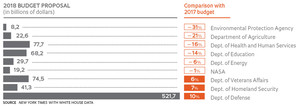 US President Donald Trump has announced plans to cut the National Institutes of Health (NIH) budget by 18 percent in the next fiscal year. The country’s top medical research agency could lose US$5.8 billion from its current budget of US$32 billion. The announcement was made on March 29, just a few days after Trump sent his budget proposal to Congress, which also restricts the amount of money invested in research by other agencies, such as the Department of Energy and NASA (see table). The plan, which faces resistance and is yet to be voted on by the Senate, has caused consternation in the scientific community. “Cutting research funding is like cutting the engines off an airplane that’s too heavy for takeoff,” said Jason Rao, director of international affairs at the American Society for Microbiology, in an interview with the journal Nature, which published an editorial against the proposal on March 17. At a hearing at the U.S. House of Representatives, Secretary of Health and Human Services Tom Price acknowledged that the role played by the NIH is “incredibly important,” but argued that the agency’s budget may be reduced to avoid inefficiencies. “About 30 percent of NIH resources end up being used to cover indirect project expenses,” Price said. Under the government’s proposal, the only departments that could see their budgets increased are Homeland Security, Defense, and Veterans Affairs.
US President Donald Trump has announced plans to cut the National Institutes of Health (NIH) budget by 18 percent in the next fiscal year. The country’s top medical research agency could lose US$5.8 billion from its current budget of US$32 billion. The announcement was made on March 29, just a few days after Trump sent his budget proposal to Congress, which also restricts the amount of money invested in research by other agencies, such as the Department of Energy and NASA (see table). The plan, which faces resistance and is yet to be voted on by the Senate, has caused consternation in the scientific community. “Cutting research funding is like cutting the engines off an airplane that’s too heavy for takeoff,” said Jason Rao, director of international affairs at the American Society for Microbiology, in an interview with the journal Nature, which published an editorial against the proposal on March 17. At a hearing at the U.S. House of Representatives, Secretary of Health and Human Services Tom Price acknowledged that the role played by the NIH is “incredibly important,” but argued that the agency’s budget may be reduced to avoid inefficiencies. “About 30 percent of NIH resources end up being used to cover indirect project expenses,” Price said. Under the government’s proposal, the only departments that could see their budgets increased are Homeland Security, Defense, and Veterans Affairs.